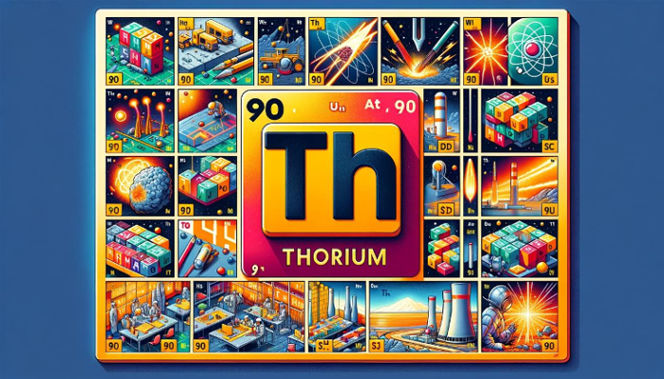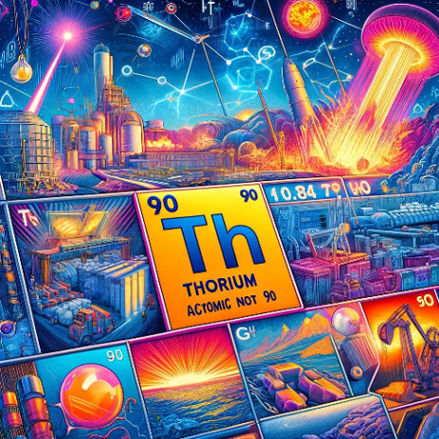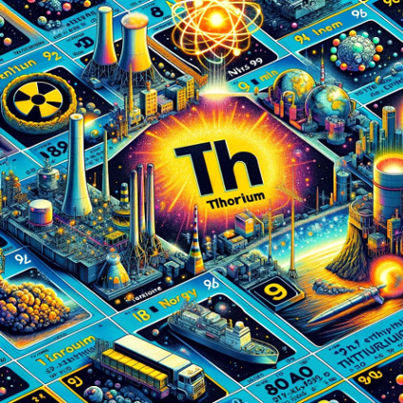
Military Implications and Proliferation Risks
The most pressing concern surrounding thorium adoption is its potential for weaponization. Although thorium itself is not fissile, the process of breeding it into uranium-233 (U-233) raises severe proliferation risks. Developing countries with limited regulatory oversight and ambiguous military intentions may exploit thorium technology for weapons production under the guise of peaceful energy programs. The lack of established international safeguards and the difficulty in detecting the diversion of thorium resources make this a significant threat to global security.
The adoption of thorium reactors in regions with ongoing conflicts or geopolitical tensions could further destabilize already volatile situations. Countries with advanced thorium capabilities could gain a significant military advantage, potentially leading to regional arms races and increased risks of nuclear confrontation. The dual-use nature of thorium technology blurs the line between peaceful energy production and weapons development, making it challenging to ensure that thorium is used solely for civilian purposes.
Moreover, the proliferation risks associated with thorium extend beyond the direct weaponization of U-233. The production of U-233 also generates highly radioactive isotopes such as uranium-232 (U-232), which can be used to create radiological dispersal devices (RDDs), commonly known as “dirty bombs.” The potential for non-state actors or terrorist groups to acquire these materials through illicit means poses a significant threat to global security.
The military implications of thorium adoption also include the potential for the development of advanced nuclear propulsion systems for naval vessels and submarines. The high energy density and long fuel cycles of thorium reactors make them attractive for military applications, potentially providing countries with enhanced naval capabilities and greater strategic advantages. This could lead to a shift in the balance of power in maritime domains and increase the risk of naval conflicts.
Geopolitical Implications and Scenarios
 The geopolitical implications of thorium adoption are far-reaching and complex. As developing countries with ambiguous military intentions pursue thorium-based energy programs, the risk of nuclear proliferation and the alteration of regional power dynamics becomes increasingly apparent. These countries may leverage their thorium resources to gain economic and strategic advantages, potentially reshaping global energy markets and geopolitical alliances.
The geopolitical implications of thorium adoption are far-reaching and complex. As developing countries with ambiguous military intentions pursue thorium-based energy programs, the risk of nuclear proliferation and the alteration of regional power dynamics becomes increasingly apparent. These countries may leverage their thorium resources to gain economic and strategic advantages, potentially reshaping global energy markets and geopolitical alliances.
In a scenario where thorium becomes widely adopted without adequate safeguards, the risk of nuclear terrorism and the unauthorized transfer of sensitive technologies to nonstate actors increases significantly. The potential for thorium to be used in dirty bombs or improvised nuclear devices poses a grave threat to international security. The lack of comprehensive monitoring and control mechanisms in developing countries further exacerbates these risks.
Another plausible scenario is the emergence of a “thorium race” among nations seeking to dominate this new energy frontier. As countries compete for access to thorium resources and advanced reactor technologies, geopolitical tensions could escalate, leading to proxy conflicts and resource nationalism. This could result in the formation of new alliances and the realignment of existing ones, with countries forming blocs based on their thorium capabilities and interests.
In a more optimistic scenario, the responsible and well-regulated adoption of thorium technology could help address energy security concerns and reduce dependence on fossil fuels. Countries with abundant thorium reserves, such as India and Brazil, could emerge as key players in the global energy market, fostering economic growth and development. However, this scenario relies heavily on the establishment of robust international frameworks and the adherence to strict non-proliferation measures.
Regulatory and Safety Challenges

The adoption of thorium-based nuclear energy in developing countries with weak regulatory frameworks poses significant safety risks. The lack of robust safety standards, inadequate infrastructure, and limited expertise in handling radioactive materials increase the likelihood of accidents and environmental contamination. The potential for mismanagement of thorium fuel and the improper disposal of radioactive waste could have severe consequences for public health and the environment.
The absence of strong international oversight and the limited capacity of the International Atomic Energy Agency (IAEA) to monitor thorium programs in developing countries further compound these risks. The potential for corruption, lack of transparency, and the circumvention of safety protocols in countries with ambiguous military intentions creates a dangerous environment where the misuse of thorium technology could go unchecked.
Furthermore, the development of thorium-based nuclear facilities in regions prone to natural disasters, such as earthquakes or tsunamis, poses additional safety concerns. The vulnerability of these facilities to catastrophic events could lead to the release of radioactive materials, causing widespread contamination and humanitarian crises. The lack of emergency preparedness and response capabilities in many developing countries further amplifies these risks.
The dual-use nature of thorium technology and the challenges in distinguishing between peaceful and military applications make it imperative for the international community to establish comprehensive monitoring and control mechanisms. As the global energy landscape evolves, it is crucial to prioritize the peaceful and responsible use of thorium technology. This requires a concerted effort from governments, international organizations, and the scientific community to develop and enforce strict regulations, enhance transparency, and promote the secure and sustainable adoption of thorium-based energy programs. Failure to address these risks could have catastrophic consequences for global security and stability.
The use of thorium technologies to power data centers in developing countries with ambiguous military intentions serves as a stark reminder of the complex challenges and dangers associated with this emerging energy source. The international community must remain vigilant, proactive, and united in its efforts to mitigate these risks and ensure that thorium adoption does not become a catalyst for nuclear proliferation and conflict. Only through a comprehensive and collaborative approach can we harness the potential benefits of thorium while safeguarding against its inherent dangers.


